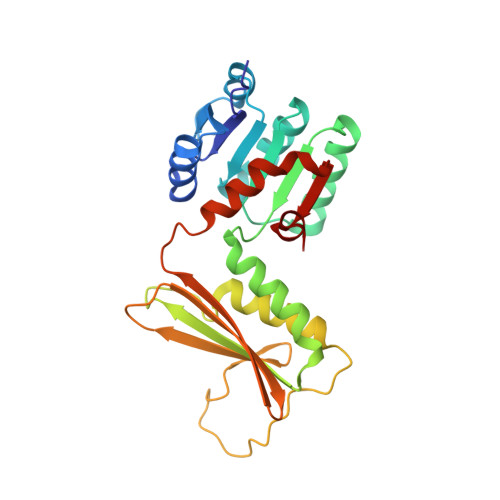Comparative structural and mechanistic studies of 4-hydroxy-tetrahydrodipicolinate reductases from Mycobacterium tuberculosis and Vibrio vulnificus.
Pote, S., Kachhap, S., Mank, N.J., Daneshian, L., Klapper, V., Pye, S., Arnette, A.K., Shimizu, L.S., Borowski, T., Chruszcz, M.(2021) Biochim Biophys Acta Gen Subj 1865: 129750-129750
- PubMed: 32980502
- DOI: https://doi.org/10.1016/j.bbagen.2020.129750
- Primary Citation of Related Structures:
5TEJ, 5TEK, 5TEM, 5TEN, 5TJY, 5TJZ, 5UGV, 5US6 - PubMed Abstract:
The products of the lysine biosynthesis pathway, meso-diaminopimelate and lysine, are essential for bacterial survival. This paper focuses on the structural and mechanistic characterization of 4-hydroxy-tetrahydrodipicolinate reductase (DapB), which is one of the enzymes from the lysine biosynthesis pathway. DapB catalyzes the conversion of (2S, 4S)-4-hydroxy-2,3,4,5-tetrahydrodipicolinate (HTPA) to 2,3,4,5-tetrahydrodipicolinate in an NADH/NADPH dependent reaction. Genes coding for DapBs were identified as essential for many pathogenic bacteria, and therefore DapB is an interesting new target for the development of antibiotics. We have combined experimental and computational approaches to provide novel insights into mechanism of the DapB catalyzed reaction. Structures of DapBs originating from Mycobacterium tuberculosis and Vibrio vulnificus in complexes with NAD + , NADP + , as well as with inhibitors, were determined and described. The structures determined by us, as well as currently available structures of DapBs from other bacterial species, were compared and used to elucidate a mechanism of reaction catalyzed by this group of enzymes. Several different computational methods were used to provide a detailed description of a plausible reaction mechanism. This is the first report presenting the detailed mechanism of reaction catalyzed by DapB. Structural data in combination with information on the reaction mechanism provide a background for development of DapB inhibitors, including transition-state analogues.
- Department of Chemistry and Biochemistry, University of South Carolina, Columbia, SC 29208, USA.
Organizational Affiliation:



















